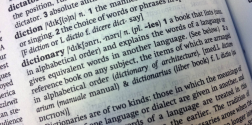This is part two of common mispronunciations, ‘wrong words’ and how to avoid them. You can read Part One here.
It can be awfully embarrassing to discover that you have been mispronouncing a word incorrectly your entire life. Sometimes it can be because you have the whole word wrong and you just didn’t realise, because maybe you hadn’t seen it written down. The reality is that, despite our best efforts, most of us mispronounce a word from time to time.
Here’s some more from the list we have gathered together of commonly mispronounced words. Some of them are so commonly mispronounced that alternative spellings and pronunciations are being included in online reference tools.
Starting with an old favourite….
hyperbole [hy-per-buh-lee] – NOT ‘hyper-bowl’. It refers to the literary technique of exaggerating for effect or making claims that aren’t intended to be taken seriously. Eg. “The important message at the heart of the issue was at risk of being lost in the barrage of accusations, claims, counter-claims, and colourful hyperbole.”
regardless – NOT ‘irregardless’ – the ‘less’ already says ‘without’ so the ‘ir’ is superfluous – it is a duplication of the same meaning. The Oxford dictionary suggests this (incorrect) word is probably a blend of irrespective and regardless.
liable – [li-a-ble] NOT ‘libel’, unless you mean a published false statement that is damaging to a person’s reputation -a published form of defamation. Liable means you are subject to or legally responsible for something, as in, “you will be liable for any breach of contract.”
moot (rhyming with boot) – NOT ‘mute’ [myewt]if you mean something that is uncertain or open to debate, as in: “How much the changes were the result of his actions is a moot point.” Use mute if you mean not speaking or making any sound.
nuclear [new-klee- ah] – NOT ‘nucular’ [new-kew-lahl It’s more common in the US (think George W Bush) but it is just wrong!
orient [oh-ree-ent] – NOT ‘orientate’ [oh-ree–ent-ate] when you mean ‘align to’ or ‘direct toward’. Orient is the verb, ‘orientation’ is the noun. The error, ‘orientate’, is a back-formation from orientation. We don’t need this when we already have orient. (See also ‘interpretate’ below)
interpret – NOT ‘interpretate’. Perhaps not as common as orientate but the same problem (see above). It’s a back-formation from interpretation, it is unnecessary and it’s wrong.
tenterhooks – NOT ‘tenderhooks’. ‘Tenters’ are frames for stretching cloth taut while it dries, but the expression has evolved to mean, ‘being in a state of anxious suspense’. See an article here on Frank & Earnest about the meaning behind tenterhooks.
prerogative [preh-rog-uh-tiv] – NOT ‘per–rog ative’ – when referring to a right or advantage belonging to a particular person or group because of their importance or social position. It has an ‘r’ after the ‘p’.
awry [or-rye] – NOT ‘aww-ree’ – to describe when things go a bit pear-shaped or not according to plan.
often [off-en] – NOT ‘off-ten’. The ‘t’ is silent, end of story.
niche [neesh]– NOT ‘nitch’. Helpful when you want someone to know that you’re referring to a small recess in a wall or a job someone is especially well-suited to; lest they think you’re talking about an unpleasant tickling sensation that induces scratching, ie ‘an itch’. Commonly confused words:
Commonly confused words:
utmost [utt-most] vs upmost [upp-most] Be careful not to confuse these.
– utmost means of the greatest measure, highest degree, largest quantity, furthest distance etc, as in: “It was the timing of the event that was of the utmost importance.”
– upmost is an abbreviated form of ‘uppermost’, meaning highest in rank, place or position, as in: the birds could always be found in the upmost branches of the tree.
founder – vs flounder – Nothing to do with fish… As verbs, both words have similar meanings but flounder means to make a lot of errors or to have difficulty moving forward. To ‘founder’ is to totally fail.
silicon [sill-eh-con] vs silicone [sill-eh-kohne] – they seem like basically the same word, give or take an ‘e’, and they’re both materials of some kind, so it is confusing. But here’s the difference:
– silicon (Si on the Periodic Table of Elements) is the second most common chemical element on earth; present in sand and glass and is best known as a semiconductor material in electronic components (think silicon chips and the northern Californian technology capital referred to as Silicon Valley).
– silicone is a rubbery compound used in a variety of things including sealants, adhesives, lubricants, cooking utensils (eg. non-stick cookware), thermal and electrical insulation and medicine (eg. breast implants).
Different meanings, different pronunciations. Con vs cone!
‘For all intents and purposes’ – NOT ‘for all intensive purposes’. While ‘intensive purposes’ might be the reason why the surgical department in a hospital needs new equipment, it isn’t the phrase that most people are looking for when they mean ‘in every practical sense’.
Of course there are many more so we will return for a part 3. Do you have a favourite to share? Or your own embarrassing story?






